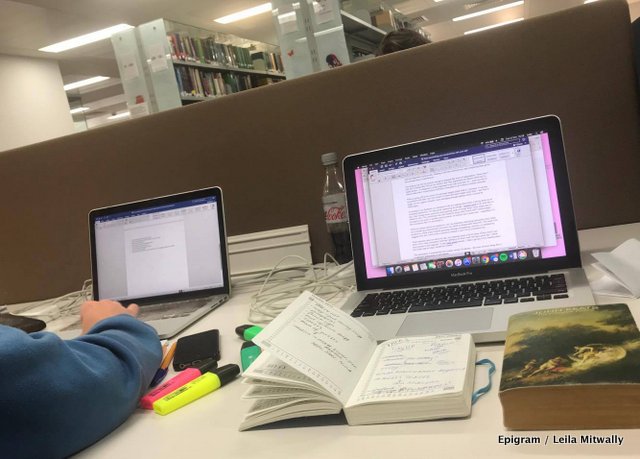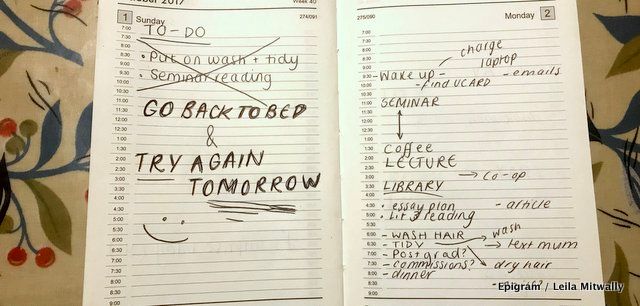With deadline season looming, Online Wellbeing Editor Leila Mitwally argues that we should stop placing so much importance on our productivity for the sake of our mental health.
I am a list maker. I like to have my whole day, week, and month summed up in a series of neat and digestible bullet points. Making to-do lists comforts me, and completing them gives me a strong sense of satisfaction.
while an intense need to be productive isn’t an inherently damaging personality trait, when you consider its implications it becomes one which is dangerously reductive
The thing is, my life isn’t hectic enough to demand this level of organisation. These aren’t lists full of things like ‘fill out tax returns’ and ‘buy ingredients for dinner which isn’t a baked potato’, or whatever it is that important to-do lists look like. No – mine are full of menial tasks that I would almost definitely remember to do without a written reminder.

Without going off on too much of a personal tangent (stick with it, I promise I’m going somewhere with this) I am now aware of where this habit might come from – and why it might, for me, signal a broader, more damaging thought pattern which I should be challenging.
According to my therapist, my incessant to-do list making stems from a strong desire to be constantly productive. It’s less about organising the things I actually need to do each day so that I don’t forget them, and more about getting loads of things done, every single day, at whatever cost.
This conclusion was also based on some other weird stuff I unknowingly divulged at one point or another and not purely on the fact that I make lists – regardless, it’s this conclusion that I’m interested in.
Your worth and your productivity are entirely unrelated
While an intense need to be productive isn’t an inherently damaging personality trait, when you consider its implications it becomes one which is dangerously reductive. The need to be productive, which when fulfilled generates feelings of happiness, comfort, or satisfaction, suggests that one’s self-worth is somehow related to one’s level of productivity.
When someone asks me about my day, my response tends to be in terms of how much I got done, with a clear connection between “getting a lot done” and “having a good day”. Much less common is the response “It was really good actually, I didn’t get any of my reading done but I had a nap so long I missed two meals”.

This association is problematic for a whole variety of reasons – the most obvious being that it is seriously detrimental to self-esteem.
The point is, you are worth more than your productivity. Your worth and your productivity are entirely unrelated. Your worth is derived from your existence: you are worth one whole human being, the same as every other human being, and you are worth this whether or not you get 300 words written before 5pm so that you can go to the pub with your friends. Congratulations! We’re all the same here, and also Yellowstone super volcano could erupt at any point plunging us into a volcanic winter and devastating life on Earth. Go to the pub.
Also, without sounding harsh, nobody else cares how productive you are. Of course, productivity is important for important things, and “getting stuff done” or whatever, but it doesn’t define you in any way. What does is things like your sense of humour, where your passions lie, how you comfort a friend who’s upset, and that weird noise you make when the delivery guy calls you to say he’s outside with your food. Do you honestly think that your loved ones value you less when you didn’t finish your seminar reading so had to go and embarrassingly blag it? Would you think any different of them?
I am so caffeinated I could probably save the world if only I could leave my bed and practise basic self care
— Leila Mitwally (@ukulayla) April 11, 2017
This association also raises an obvious question - what happens when the productivity stops? If I’m worth no more than what I get done, what am I worth when all I’ve done for 24 hours is lie in bed and eat poorly made porridge?
I’m not depreciating the importance of being proactive and advocating that we all just give up and relax because nothing matters: being productive is great, and important in the context of being a student – but it should be detangled from your sense of self.
Over time, placing so much emphasis on my productivity levels started to cause genuine disruption in my day-to-day life as a student.
My mental health issues cause me to dissociate. These episodes are quite random, but are more intense when I’m stressed. This poses quite an issue when deadline time rolls around – when I’m not only far more stressed than usual (hello numbness my old friend) but also, coincidentally, far more likely to put a lot of pressure on how much I get done each day.
This creates a wonderful little self-sabotaging cycle of panic. Firstly, some specified (usually small) stressor associated with my deadline hits me, and I’m spacing out in the library – my eyes will glaze over and my vision will blur, so that it becomes difficult to read what’s in front of me. Then my brain will sort of shut off – my mind turns to fuzz and I can’t think straight, and I feel like some kind of cold shell of a human in a room full of warm humans who can all irritatingly process what they’re seeing while I sit trying to put together all the evidence that I’m not dreaming.
I used to not understand this process at all. My brain would be 80% confused cloud of nothingness and 20% “OH MY GOD YOU HAVE A DEADLINE WHY CAN’T YOU THINK LIKE A NORMAL BRAIN PLEASE STOP” – i.e. more stress, which inspires more numbness, until eventually I’m just a big egg in a library chair who shouldn’t own a laptop and definitely knows nothing about 18th Century poetry. Though the initial disassociation isn’t caused by my relationship with my productivity, this certainly doesn’t diffuse the situation.
On a side note, it’s important to feel accomplished for doing these little things when you’re finding it difficult to do anything – like washing your hair, doing your food shop, or responding to an email – but my point is that your ability to do these things shouldn’t affect how you think of yourself. People move at different rates, and for a lot of us treading water is the best that we can do with the situation at hand. Eventually a time will come when you’re able to swim quicker and that feel like second nature. You’re the same person at whichever speed, and for now you’re doing more than fine. Pushing yourself to go faster when you aren’t ready or well enough to do so can prolong the struggle.

I’m trying to stop thinking better of myself when I get a lot done, every single day, even when I don’t urgently need to or when I’m feeling particularly unable. When I disassociate, I try my best to let go of whatever I’m doing, allow feelings to pass and then return later when I’m feel less like a strange virtual version of myself.
Instead of breaking down in panic or staring at the wall for hours on end when I have nothing on my to-do list for the day, I am trying to accept that I can’t, nor should I be constantly busy. When you’ve been working yourself so hard you feel a crash coming on, holding it off will only make it hit you worse when you finally crack.
There are more important things than your productivity.
Featured image: Epigram / Leila Mitwally
Do you place too much importance on your productivity? Comment below or get in touch!
Facebook // Epigram Wellbeing // Twitter









